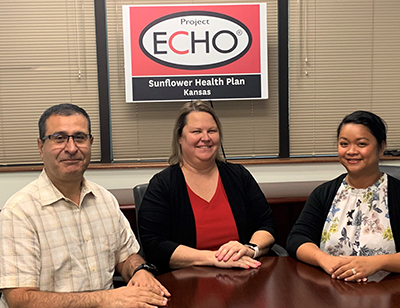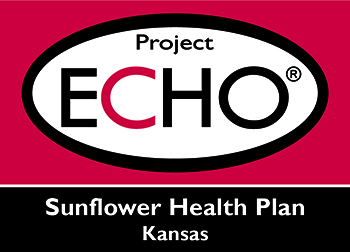Project ECHO Sunflower Health Plan
Collaborative Learning Opportunity with FREE Continuing Education:
About Project ECHO
Project ECHO® (Extension for Community Healthcare Outcomes) is a self-paced lifelong learning and guided practice model that revolutionizes medical education and exponentially increases workforce capacity to provide best-practice specialty care and reduce health disparities.
Project ECHO creates a bridge to allow collaboration and knowledge sharing. The heart of the ECHO model™ is its hub-and-spoke knowledge-sharing networks, led by expert teams who use multi-point videoconferencing, such as Zoom, to conduct virtual clinics with community providers. In this way, primary care doctors, nurses, and other clinicians learn to provide excellent specialty care to patients in their own communities.
The ECHO model is not traditional “telemedicine” where the specialist assumes care of the patient, but is instead tele-mentoring, a guided practice model where the participating clinician retains responsibility for managing the patient.
Project ECHO is not just a learning and mentoring network; it is also a professional community. Participants are encouraged to ask questions, provide input and guidance to one another, and engage actively in discussions, both during and after a session.
For more information please visit the ECHO Institute at the University of New Mexico's Health Science Center.
Four principles comprise the Project ECHO model. The combination of these principles results in a unique and successful approach for improving clinician satisfaction, enhancing clinician knowledge and self-efficacy, and improving patient satisfaction and outcomes:
- Amplification: Use technology to leverage the expertise of a multidisciplinary team.
- Best Practices: Share best practices to reduce disparities and standardize care.
- Case-Based Learning: Leverage case-based learning and guided practice to master complex cases.
- Database: Apply web-based tools to monitor outcomes.
What is a hub?
A regional center where a team of subject matter experts for an ECHO program is located, replicates the ECHO Model™ and runs their own ECHO program. Sunflower Health Plan is a Project ECHO hub.
What is a Case Study?
Project ECHO is a case-based learning option for care providers. A case is an overview of an individual’s medical history and overall health.
How much does it cost to participate?
Participation is free. You generally only need to have standard internet connections and a computer.
Is continuing education available?
Case by case basis depending on the program. This information will be listed for each ECHO series.
How is patient or member information protected?
All the patient/member information presented in a session are de-identified and reviewed before the session. A HIPAA announcement is given prior to the start of each session to remind both specialists and clinicians about the importance of preserving patient confidentiality.
Who should participate?
Individual clinicians of all levels are welcome and highly encouraged to participate in sessions, including physicians, physician assistants, nurse practitioners, registered nurses, psychiatrists, social workers, community health workers and pharmacists. Team participation is encouraged, as team-based care is the ideal model for enabling higher-level care delivery and task shifting.

Sunflower Health Plan Project ECHO Team
Mohamed Radhi, MD; Nan Perrin, PhD, BCBA-D, LBA; Kristine Meier
- Nanette Perrin, PhD, BCBA-D, LBA, Senior Director of LifeShare & Social Determinants of Health
- Mohamed Radhi, MD, Medical Director, Medical Management, Pediatric Hematologist/Oncologist, Pediatric Bone Marrow Transplant
- Ulisa Diane Buckingham, MD, Medical Director, Medical Affairs, Child, Adolescent, & Adult Psychiatrist, Behavioral Health
- Deborah Rear, RN, BSN, MBA, Senior Manager, Case Management
- Kristine Meier, MSEd, BCBA, Transitions of Care Coordinator, Program Manager
- Kelley Hotaling, PharmD, Clinical Pharmacist
- Aaron Dold, PharmD, Clinical Pharmacist
Contact: projectECHO@sunflowerhealthplan.com

Accreditation
Continuing Medical Education (CME)
The University of Missouri – Continuing Education for Health Professions is accredited by the Accreditation Council for Continuing Medical Education (ACCME) to provide continuing medical education for physicians.
The University of Missouri – Continuing Education for Health Professions designates this educational activity for a maximum of 1 AMA PRA Category 1 Credit(s)™. Physicians should only claim the credit commensurate with the extent of their participation in the activity.
Nursing Contact Hours
University of Missouri Sinclair School of Nursing is approved as a provider of nursing continuing professional development by the VTL Center for Professional Development, an accredited approver by the American Nurses Credentialing Center’s Commission on Accreditation.
Participants may earn 1.0 contact hour.
Successful Completion
Successful completion of this activity — includes participating in the educational offering, the evaluation process and completing the verification of attendance — enables the learner to satisfy the requirements for continuing education.
Sunflower Project ECHO: Closing the Gap: Care Access
We invite you to attend this series, which will focus on:
- Broadening understanding of the need for a coordinated, collaborative effort to increase accessibility.
- Broadening understanding of resources for lower income, poverty level, or rural populations.
- Understanding how to access support systems and services within the state.
Please plan to attend our Project ECHO sessions on Thursdays in October 30, November 6, 13, and 20, 2025, from 12:00-1:00 PM CT via Zoom video conferencing.
Topics include:
- October 30, 2025 - Pyx Health – Shaun Persaud and Brian Riley, Pyx Health
- November 6, 2025 – Homelessness – Desira Corey, LMSW, Clinical Coordinator of Homeless Services, Mental Health America of South Central Kansas
- November 13, 2025 – Human Trafficking – Marti Campbell, Education Coordinator, ICT SOS
- November 20, 2025 – Child Abuse Prevention - Trina Morgan, Director of Program Development and Training, Kansas Children Service League
Dates to vary by speaker availability.
October 30, 2025 - Pyx Health, Pyx Health Adult flyer, Pyx Health Youth flyer – Shaun Persaud and Brian Riley, Pyx Health
Case Study Recommendations:
- Check member’s A1C, fasting glucose, lipids, and thyroid function labs.
- Verify that the member is being followed by a psychiatrist.
- Peer-to-peer medication review with the prescribing provider.
- Follow up on the PT/OT therapy.
- Is the member’s pulse ox being monitored since he has COPD?
- Is the oxygen level triggering the irritability?
- Psych testing, possible duplicative diagnoses.
- Explore trauma therapies such as EMDT or ART
- Explore with member what it is about a small community that he likes
- Would he be open to receiving some of his services via telehealth?
- Offer a referral top Pyx Health- app offered through Sunflower to combat social isolation, connects to resources, companion calls, etc.
November 6, 2025 – Homelessness – Desira Corey, LMSW, Clinical Coordinator of Homeless Services, Mental Health America of South Central Kansas
Case Study Recommendations
- Show the member a 30 second to 1 minute video clip of himself with others and ask him to focus on the reaction of others. Does he see an recognize how his behavior impacts those around him? How would he like if he was on the receiving end.
- Inquire whether member is interested in shared living.
- Complete a Quality of Life assessment with the member.
- Member wants a car/wife/house. What characteristics is he looking for in a wife, car or housing? What characteristics does the member feel he has that would attract a partner? Perhaps help the member identify some small steps, that he is willing to take, to attract said partner. What is the value of having a partner means to him.
- Utilize Person-Centered and/or LifeCourse tools to help him create a trajectory for his goals.
November 13, 2025 – Human Trafficking – Marti Campbell, Education Coordinator, ICT SOS
Case Study Recommendations:
- Complete a comprehensive psych evaluation.
- Connect member with Pyx Health to help with feeling isolated.
- Recommend the member participate in a self-empowerment class.
- Refer member to pain management or physical therapy.
- Explore trauma-focused therapies such as ART (Accelerated Resolutions Therapy) or EMDR
- Explore support groups that are virtual for individuals affected by inter-partner violence
- Lab follow ups
November 20, 2025 – Child Abuse Prevention – Trina Morgan, Director of Program Development and Training, Kansas Children Service League
Case Study Recommendations
- Consult with an occupational therapist for doing a sensory assessment or sensory profile evaluation, looking for those different replacements, for sensory.
- Complete a medication review for drug interactions looking for patterns with hyperactivation or disinhibition
- Have they tried Parsons Outreach, or KU's, special programs?
- Life share consultation for Sunflower
- Complete a functional behavior assessment to identify those potential triggers, and put in those environmental strategies for the family
- Children's behavior interventionist services assessment
Register for the Sunflower Project ECHO: Closing the Gap: Care Access
Note: After registering you will be given the opportunity to save the series to your calendar of choice. You will also receive an invite via email.
Please do not forward your invite, as it is specific to each person.
To receive clinician continuing education credit from the University of Missouri or certificate of completion from Sunflower Health Plan, each participant must register individually.
Previous Series
Presentations and recommendations for previous Project ECHO sessions can be found on the Project ECHO archive page.

